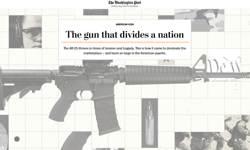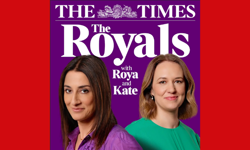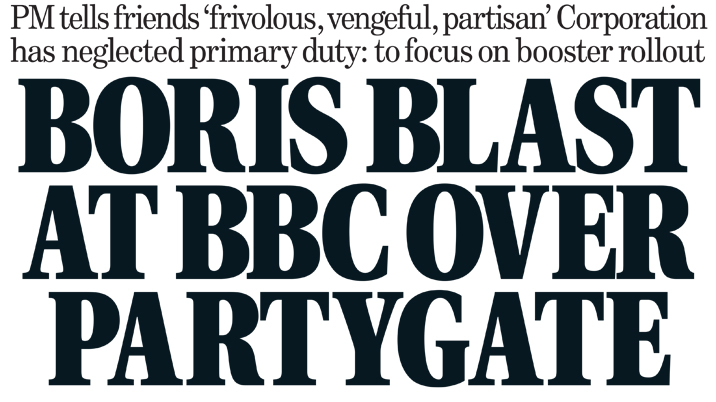
Criticising government: no job for the BBC
“Boris blast at BBC over Partygate” bellowed the Mail on Sunday last weekend. This was quite a front page. The Prime Minister was, the paper reported, cross with the broadcaster for its “frivolous, vengeful and partisan” coverage of the myriad controversies over Christmas celebrations that may or may not have taken place in the corridors of power while the rest of the country was observing the rule of six and not sharing turkey with their families.
The BBC was, the narrative continued, neglecting its “primary duty” of promoting the campaign to get everyone to have a booster vaccination against Covid.
Or put another way, “The BBC should be saying what I want it to say and not looking into things I may or may not have done that may or may not have broken the rules.”
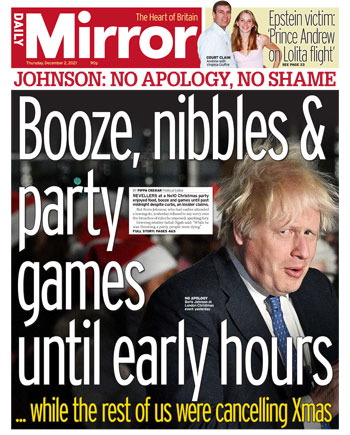
As I say, that’s quite the assertion. Set aside for a moment the fact that it was the Mirror and ITN that made the running on the party stories; the BBC merely followed where everyone else did. Even the Mail on Sunday’s daily sister splashed on them on successive days: “A sick joke” when the Allegra Stratton video appeared and then “One rule for them, new rules for the rest of us” the next day.
For isn’t “holding the rich and powerful to account” a mantra for most newspapers when arguing for a free Press (and, presumably by extension, broadcast media)? The whole point is that it is right to go prodding into areas these powerful people don’t want examined; “that news is what someone doesn’t want published, everything else is advertising”.
Indeed, the previous week, the Mail on Sunday carried an op-ed headlined: “The right to free speech must NOT be trumped by famous people’s demands to shield their reputations” and a leading article warning against “gradual and silent encroachments by those in power”. But in that case, the person trying to dictate what was newsworthy was the Duchess of Sussex, not Boris Johnson. So different rules apparently apply.

Now, giving prominence to something someone says does not automatically mean you agree with the sentiment (though it’s rare for papers like the MoS to splash on anyone expressing an opinion of which they disapprove – unless it’s under a “Now look what this idiot is saying” style headline). The paper could argue that it is merely reporting what the prime minister was saying privately, which it would contend is not only in the public interest, but a more accurate reflection of what he really thinks than his (sometimes) rehearsed public pronouncements.
Was ‘partygate’ really a distraction?
However, the leader page made clear that the paper did indeed agree with what the PM was saying about the corporation, with its main headline “How can the BBC think ‘Partygate’ is bigger news than Omicron?” The parties were foolish and the lies about them worse, but anyone watching the BBC would get the impression that they were more important than the battle against Covid and encouraging people to get vaccinated. Which is not at all the impression you’d have got from the daily, which had cottoned on to the need for people to go for their jabs the day before – after two days of party splashes and one on the planned Tory mutiny over the new “Plan B” restrictions.
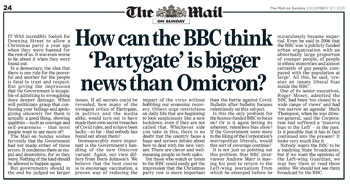
As both titles well know, the parties controversy was never treated by anyone as “bigger news than Omicron”. It was a big story because of Omicron. Because if those making the rules flouted them (yet again), there was a real danger that no one else would obey them – or heed exhortations to get inoculated – and thereby increase the risk of more people dying and of the health service being unable to cope. Indeed, an opinion poll for the Mail found that a third of voters were less likely to follow the rules as a direct result of the Downing Street shenanigans.
The Mail titles’ approach was classic cakeism. Neither is in favour of Plan B, which they see as a “kneejerk” reaction to the new variant (a description also used by David Davis in a full-page op-ed for the daily). “Vaccinations alone should be sufficient”, “We must learn to live with coronavirus” are the key messages. After all, no one, the daily reported on Saturday, had needed hospital treatment for omicron and no one had died. Well, they have now.
But last week, they sought to play down the significance of the new variant, while berating the BBC for not bigging it up; their own poll found that two-thirds of voters had lost trust in the prime minister, but they still berated the BBC for making too much of the behaviour that cost him much of that trust.
That MoS lead was never really a story about the government’s response to the pandemic. It was just another opportunity to bash the BBC.
As both titles well know, the parties controversy was never treated by anyone as “bigger news than Omicron”.
Falling into line
The BBC nevertheless clearly took the prime minister’s dismay to heart. Monday night’s ten o’clock bulletin on BBC1 led on the queues for booster vaccines with reports and on-screen internet links to booking portals from all four home nations. Big-hitters Hugh Pym, Laura Kuenssberg and Fergus Walsh were all pressed into service to report from hospitals, GPs’ surgeries, Westminster and the studio. There was also a special report from South Africa, where Omicron was first identified. In all, the coronavirus coverage took up the first 21 minutes of a 28-minute bulletin.
If you harboured any doubts that the BBC is running scared of the Government and of what Nadine Dorries has in store for it, perhaps now is the time to shed them.
The press: failing to do its job
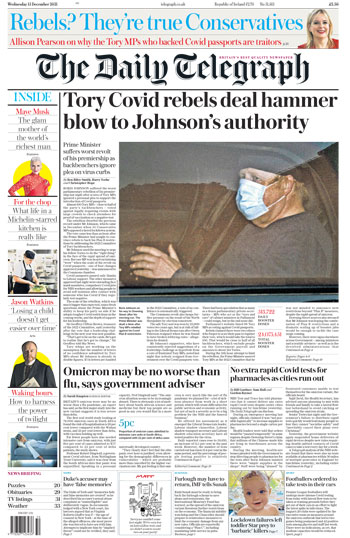
On Tuesday, 99 Conservative MPs voted against the government in an attempt to block the introduction of “vaccine passports” for those wishing to go to crowded events. Rebels used emotive language to voice their opposition to the measure – it was a step on the road to totalitarianism, it was like Nazi Germany, we were moving towards a dictatorship, it was an assault on individual liberties. There was a lot of coverage of these opinions in newspapers from across the political spectrum.
Meanwhile, Priti Patel was adding bits to her policing bill – the one that already intended to impose tougher sentences for throwing paint at a statue – to allow police to stop and search people “without suspicion” and to ban named individuals from protesting if they are regarded as having form in that area. The bill is now working its way through the Lords. The Conservatives who voted against Covid passports or mandatory mask-wearing on Tuesday in the name of protecting freedom did not rebel when it came to protecting the freedom to protest. Patel’s extra measures, on which the Commons has yet to vote, are sailing through the Lords.
Patel is also embellishing her Nationalities and Borders Bill. Last week, she added provisions that could strip millions of people of their British citizenship. These, too, are winning the approval of freedom-loving MPs. They will probably also back Dominic Raab’s new assault on the Human Rights Act.
This country voted in this government with a huge majority; it can claim a mandate for what it aims to do. But we still need to watch how they go about achieving those ends. That is the primary role of press and broadcasters – back to the good old “calling authority to account”.
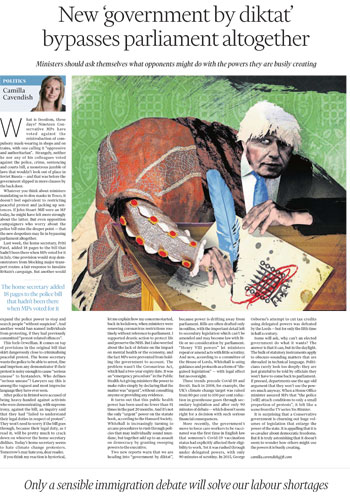
There will inevitably be backlash from “the usual suspects”, such as the Guardian. But would you describe the former head of the No 10 policy unit in a Conservative administration, a Conservative peer to boot, as one of the usual suspects?
Camilla Cavendish, a former Times journalist and aide to David Cameron, wrote in the FT and the i that our democracy was under assault, that power was seeping from Parliament, that we were drifting towards Orwellian despotism.
This piece was not surprising because of its authorship or worrying because of its content, but because it was one of the few to look at all at the progress of the policing Bill. Only the Guardian and Mirror joined the two papers that carried Cavendish’s article in reporting any of the latest developments over the past couple of weeks.
There was more coverage of the Nationalities and Borders Bill, but here it wasn’t the power to strip people of their citizenship, but the moves to deter immigrants and deport foreign criminals that caught the eye.
How we used to do it
When I joined The Times 40 years ago, home news occupied two and a half broadsheet pages, foreign a similar amount and parliament a single page of its own. There was a political team that produced the sort of lobby coverage and analysis that we see today and a parliamentary team that reported on proceedings in the Commons, Lords and committees, in a straight up-and-down, he said-she said, fashion. When a white paper was published, an extra page would be found from somewhere to “gut” the legislation and examine it in detail. The same was true of the Guardian, Telegraph and, after it appeared in 1986, the Independent.
In those days, space was at a premium, staff were readily available. Now, the reverse is the case. No one keeps a parliamentary team, the sketchwriters are the closest we come now to full-time monitors of debate. Somewhere along the line, someone decided that readers weren’t interested in the nitty gritty – just as local newspaper proprietors, who ceased to be local, thought it was no longer necessary to send reporters to magistrates’ courts or council meetings. Readers just needed to be told the things that the editor thought important – or rib-tickling.
And so we have reached the stage where partisan media – of all persuasions – cherry-pick who and what they scrutinise. This past fortnight, we have seen it confirmed that the Mail believes the Duke and Duchess of Sussex should go under the microscope – to the extent that it is willing to spend millions to secure the right to put them there – but that the prime minister and his government’s flagship legislation should not.
Twitter does it better
This would be far less troubling if so many other “news” organisations did not seem to have the same view. Two tweets this week made this point far more eloquently than I ever could. First, the Guardian’s George Monbiot:
Twitter gets a bad rap. But the massive implications of the Police Bill amendments are being widely recognised and discussed on this platform, while they’re being almost entirely ignored by the established media. *Twitter is doing a better job than the press*.
And then the University of East Anglia’s Professor Paul Bernal:
For anyone in the media who thinks it’s bad we’re going after this government for trivial stuff like parties, remember that you’ve failed dismally to hold the government to account on important stuff like Brexit and Covid. We tried. We really did. You failed us.
Last week, Press Gazette hosted its tenth British Journalism Awards (I have been honoured to have served as a judge since their inception). They are intended to celebrate revelatory public interest journalism. There is still, thankfully, quite a lot of it about. But the back-slapping does sometimes feel a little out of place.
Papers are completely at liberty to support or oppose the government of the day, to campaign for their election or removal. But they should all at least report what it – and the opposition – are doing and not just pump out the bits that best suit them.
Somewhere along the line, someone decided that readers weren’t interested in the nitty gritty.
Deprived of her day in court

Rebekah Brooks apparently knew that Sienna Miller was pregnant before the actor had had a chance to tell her family. Miller believes that Brooks, then editor of the Sun, learnt this courtesy of a blagger who tricked medical staff into revealing private information. She says this all happened when she was at the most vulnerable moment of her life and that it caused her to make decisions that she now had to live with every day. Miller also says that Brooks promised not to publish the story, but then did.
None of these claims has been tested in court because Miller – along with a handful of other celebrities – last week accepted a substantial, but undisclosed, sum in damages from News UK. These were the latest payments to be made after the phone-hacking scandal that led to the closure of the News of the World just over a decade ago. The bill for News UK is said to have passed £1bn and claims are still rolling in. The Mirror papers have also paid out millions.
News UK has always maintained that illegal activities, including phone-hacking and blagging, were confined to the News of the World and that there was no such wrongdoing at the Sun. Miller’s complaint was pointedly directed at the Sun and its then editor – who was, of course, cleared of all charges in the hacking trial and has since returned to her post as chief executive of News UK.
After the settlement was agreed, Miller appeared outside the court to say: “It was not my choice to be standing here; I wanted to go to trial. I wanted to expose the criminality that runs through the heart of this corporation. A criminality demonstrated clearly and irrevocably by the evidence which I have seen. I wanted to share News Group’s secrets just as they have shared mine. Unfortunately, that legal recourse is not available to me or to anyone who does not have countless millions of pounds to spend on the pursuit of justice.”
The Guardian, which was the first to expose the hacking scandal, put Miller’s photograph on the front page and ran the story on page 17. The settlement was also reported, albeit generally briefly, by the Telegraph, i, Metro, Express and some regional papers. Neither The Sun nor the Times – both owned by News UK and therefore the papers most affected by the payouts – carried a single sentence. Nor did the Mail, which under Paul Dacre was scathing of the Guardian and its role in the whole saga (describing the reporter Nick Davies as “the man who did for the British Press”).
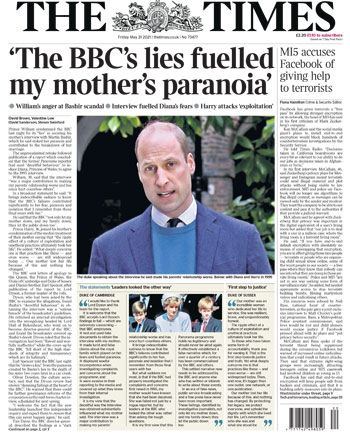
Imagine if someone had stood outside a court and made that sort of statement about the BBC. Would those papers have ignored that? Well, we don’t have to imagine. Just look back at their front pages after the Martin Bashir inquiry report. See what I mean about cherry-picking?
And here’s another thing: Miller’s statement highlighted the fact that, even as a presumably wealthy star, she couldn’t afford to pursue her case. This was because News UK had offered her so much money (though we don’t know how much) that even had she won in court, she would have lost a fortune because of the “paying into court” system. That system makes sense and stops people wasting the courts’ time – the principle being that if you reject an offer that is higher than that ultimately awarded should the jury find in your favour, then you have to pay all the costs of going to trial.
But it does, as Miller pointed out, mean that those with very deep pockets can throw money at “problems” like this and make them go away. She concluded: “Until someone comes along who can confront the Murdochs’ endless means, all that I have left are these words.”
And, of course, there is someone waiting in the wings to confront the Murdochs’ endless means: Prince Harry.
So we have this weird symmetry: Murdoch is spending squillions to stop people having their day in court – and the person he definitely doesn’t want to see there is the Duke of Sussex; Harmsworth is spending squillions to get his day in court – and the person he desperately wants to see there is the Duchess of Sussex.
And we wonder why they keep banging on about a couple they insist nobody cares about?
Miller’s statement highlighted the fact that, even as a presumably wealthy star, she couldn’t afford to pursue her case.
Arthur and Star: the latest in a tragic line

It seems that the only thing to cut through the relentless ghastliness of the pandemic is the even greater ghastliness of people who used the cover of lockdown to destroy those they were supposed to protect. We saw it last summer with the murder of Sarah Everard and we have seen it again this past two weeks with the torture and killing of Arthur Labinjo-Hughes and Star Hobson. “Not again” cried the Mail after the conviction of Star’s mother and her partner on Tuesday.
Naturally, the theme for most papers has been “How could this be allowed to happen?” They all always acknowledge, if only in passing, that the real villains are those who dealt the fatal blows, but their true focus is on the blame game: the social workers or medical staff who “let the child down” – especially in cases where family members have raised the alarm and been fobbed off.
This is, to an extent, as it should be. We need to learn lessons from these tragedies. But, as The Times wrote in a leader after the Arthur case, we have been here many times before. Serious case reviews are carried out and reach the same conclusion time and again. The question now is why, after so many reviews, the same failings keep recurring and keep going unaddressed.
Meanwhile, Fleet Street also carries on in the same old way. For a start, they give short shrift to the trials, frequently limiting coverage to the opening day when the horrors of the prosecution case are first laid out. Yesterday will have been the first time that Express, i, Metro, Telegraph, Guardian or Mirror readers had been introduced to Star Hobson. Arthur’s case garnered more attention but – if there can be a league table of such crimes – the details were even more horrific, with hours of video footage, the child’s plaintive cry “Will no one feed me” and his father’s chilling text messages “dig a grave” and “just end him”.
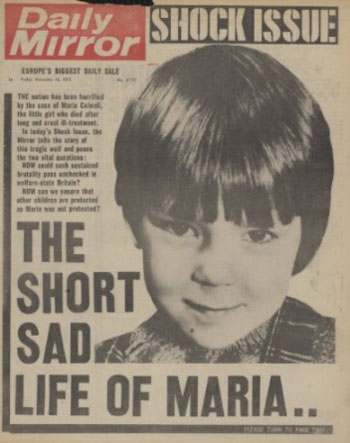
Even so, the Mirror managed only a small front-page teaser when Emma Tustin was convicted of his murder. That day it splashed on the prime minister having his booster jab and the confusion over whether people should or shouldn’t have Christmas parties. It gave four times as much space to a puff for festive food. This from the paper that describes itself as “the heart of Britain”. Whatever happened to the champion of the oppressed that ran a “shock issue” to mark the death of Maria Colwell half a century ago? Now the face of a child tortured and murdered by his stepmother is trumped by a plate of sausage toad canapes. At least it splashed on Star Hobson yesterday.
Meanwhile, the Mail has its claws into social workers, the Sun points at “wokeness”, the Telegraph at lockdown. They all have their favourite villains, and they don’t seem to include the austerity years that have seen council budgets cut and cut and cut while workloads have grown and grown and grown.
The wrong picture?
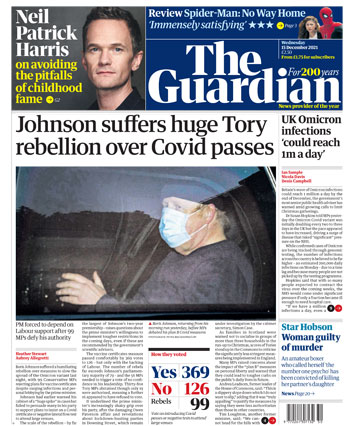
On the other side of the great political divide, the Guardian put a smiling Arthur on the front page two weeks ago with a headline about the killer couple’s “appalling cruelty”, but yesterday’s issue had only a small box on Star, with no photograph. Yes, the Commons rebellion and the prime minister’s discomfiture was probably a “better” lead story for the paper’s readership. But was a fuzzy picture of Johnson being driven back to Downing Street after his morning jog the right choice of main image? He was wearing a mask, so I guess it was newsworthy in a way.
But seriously? It’s hard to escape the feeling that the paper had deliberately buried a story that reflected badly on social workers – the paper’s only report of the case appeared on pages 20 and 21.
That bowl of cherries will soon be full to bursting.
Sir Anthony Sher

Boris the Jogger was the fourth incarnation of the prime minister to make the main front page image for the Guardian in the past fortnight. That’s some count, bearing in mind the Telegraph and Times managed only two apiece and the ultra-loyalist Express just the one. But the Guardian went some way to making amends by marking the passing of Sir Anthony Sher on its Saturday cover. How could it be that not one other national daily newspaper put even his name on their front pages?
Don’t answer that.
Mr Repetitive

As we were saying last time with the Daily Star and its Line of Duty homage headlines: once is genius, twice is clumsy. Little Miss Forgetful was brilliant and off-the-wall. But perhaps the Sun should put its Roger Hargreaves paintbox away now?
Front page of the fortnight
The Independent has been digital only for a couple of years now. But it still produces a “front page” so it can get its wares out in front of the news reviewers and on to the Twitter feeds. This one felt special.

As to the world of print, this was, I think, the best of the bunch. And it was given added poignancy in retrospect by the fact that Star Hobson’s great grandfather warned social workers “You don’t want another Baby P on your hands”.

Liz Gerard’s Notebook is a fortnightly column published in the InPubWeekly newsletter. To be added to the mailing list, enter your email address here.





